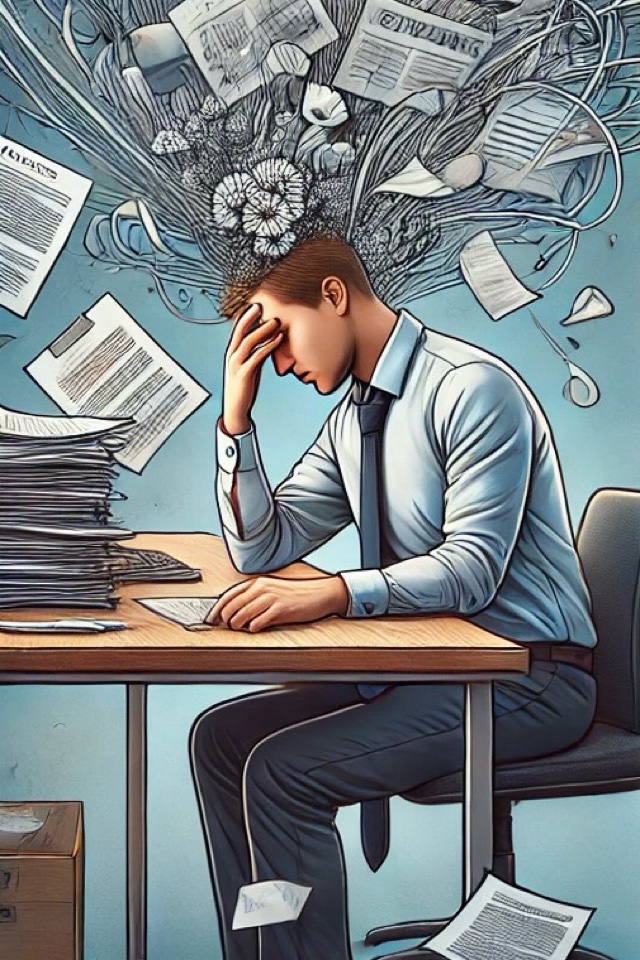Stress means different things to different people and we all experience stress from time to time.
While stress is the normal body’s reaction to harmful situations, long-term chronic stress can be detrimental to your health.
In this article, we’ll be looking at what stress is, the types, effects, consequences and management.
What Is Stress?
Stress is described as any form of change that causes physical, emotional, or psychological pressure. Your body’s response to anything that demands your focus or action is stress.
To some extent, everyone encounters stress. The way you respond to stress, however, has a significant impact on your general well-being.
What are the Types of Stress?
There are two types of stress:
- Acute stress
- Chronic stress
1. Acute stress:
This is the stress that is only temporary and disappears immediately.
You feel it when you ski down a steep slope, have a little argument with your spouse, have deadlines to meet at work, or when you’re preparing to write a test or an exam.
This type of stress also prevents you from getting into harm, for example, when you slam your brakes to avoid getting hit while driving.
During acute stress, your Hypothalamus, a little control house, stimulates the release of stress hormones that helps the body adapt to stress.
-Your heart rate increases
-Your breath quickens
-Your muscles are ready for action.
This type of stress is the natural reaction to life’s experiences.
2. Chronic stress:
This is the long-term stress that goes on for weeks or months.
Chronic stress happens when these stress hormones continue day after day, for several weeks or months without any relaxation.
You may have chronic stress if you have a troubled marriage, serious money problems, or a deeply dissatisfying job.
What happens when chronic stress is not managed?
When chronic stress is not properly managed, it can lead to serious health problems. Chronic stress also has the potential to worsen underlying health conditions.
The 4 Negative Effects of Chronic Stress on your Health
Symptoms of stress may vary because people handle it differently. For this reason, it’s important to know your stress symptoms.
Meanwhile, you may experience the following symptoms:
Physical symptoms
The following are a few examples of the physical symptoms of stress:
- Insomnia
- Upset stomach as well as diarrhea, constipation, and nausea.
- Headaches and pains
- Tense muscles
- Clenched jaw and grinding teeth
- Chest pain and rapid heartbeat
- Loss of sex drive and ability
- Dry mouth and a hard time swallowing
- Low energy
Emotional Symptoms
Stress could have distressing emotional symptoms which may include:
- Becoming easily frustrated and agitated.
- Having a hard time relaxing.
- Absentmindedness
- Feeling overwhelmed.
- Avoiding people and always being alone.
- Feeling bad about yourself.
Psychological Symptoms
Stress could also have harmful psychological effects and the signs may include:
- Poor judgment
- Forgetfulness
- Racing thoughts
- Always thinking negatively
- Lack of ability to focus
- Constantly worrying and being anxious
- Depression
Behavioral Symptoms
Some behavioral symptoms of stress are:
- Eating an excessive amount of food which leads to Obesity
- Not eating at all which leads to chronic weight loss
- Excessive use of alcohol, drugs, cigarettes
- Procrastinating and avoiding responsibilities.
- Displaying signs of nervousness such as fidgeting, pacing, shaking legs, and sweating hands.
- Excessive use of the internet as a way to escape reality.
What are the Long-term Consequences of Chronic Stress?
Long-term consequences of Chronic stress may include the following:
- Stroke or heart attack as a result of constant high blood pressure.
- Severe diarrhea, constipation, heartburn, anorexia nervosa, bulimia nervosa, Gastritis, ulcerative colitis, GERD, and irritable colon.
- Acne, psoriasis, eczema, alopecia.
- Premature ejaculation and sexual dysfunction in men and women.
How Can You Manage Stress Effectively?
Although no one can avoid stress altogether, you can work to handle and manage it in these 10 ways to keep it at bay and help you recover:
1. Exercise Regularly
Exercising helps you sleep better and this renews your brain and body. Exercising releases endorphins and other feel-good hormones that block pain and produce a euphoric feeling.
People who exercise regularly usually feel less anxious and more positive about themselves. Exercises you can try to relieve stress are:
- Dancing
- Skipping
- Taking long walks
- Cycling
- Running
- Resistance training
- Using the stairs instead of the elevator.
Just enjoy these simple exercises and ensure not to exercise too close to bedtime as this disrupts sleep for some people.
2. Make Time For Hobbies and Interests
Learn to take some time off serious work and do the things that make you relax.
These could be fun activities like:
- Gaming
- Hanging out with friends
- Reading
- Knitting
- Going to the beach
- Watching movies
- Eating out
- Doing an art project.
Just anything to help you relax and have fun.
3. Consume a Healthy and Balanced Diet to Optimize Your Health
Eating a healthy balanced diet containing fruits, vegetables, whole grains, and lean proteins can provide your body with essential vitamins and minerals.
It can also help you combat stress, feel better and be in control of your mind.
4. Seek Out Social Support
You can do this by reaching out to the trusted people in your life.
If you’re bothered about issues, talking about them with friends, family, a doctor or a therapist can be very helpful. You can also practice talking positively to yourself. Say things like “I’ll be fine”, ” I can do this”, and “I’m doing my best.”
5. Be Assertive
Know that “NO” is a complete sentence and learn to say “NO” to events or activities that will create stress in your life.
Also, learn to accept that there are circumstances or situations you can’t control.
Don’t forget to laugh when you can. Exercise your sense of humor. Laughter is also very helpful in relieving stress.
6. Relax Your Muscles
You can try stretching, going for a massage, taking a hot bath or shower, and just relaxing your muscles when they feel tense due to stress.
A good night’s sleep also helps.
7. Practice Relaxation Techniques
Taking out time every day to relax helps the body manage stress and protects the body from stress. Relaxation techniques you can choose from are:
- Deep breathing
- Yoga
- Meditation
- Prayer
- Spending time in nature
- Listening to relaxing music
8. Take Things Slow
With how busy the modern world has become, we usually want the thrill of having to accomplish so much in so little time without realizing how much burnout this can result in.
Sometimes, we just need to find ways to chill out. For example:
- If you’re a student, you can practice the Pomodoro technique of studying.
- Divide your huge tasks into smaller bits.
- Have a To-do list and reward yourself each time you meet your goals.
- Develop healthy work habits and ethics.
- If you work from home and are always on your devices or the internet, you can take healthy breaks now and then by stretching your body between work hours, taking short walks, and going on vacations.
9. Keep A Journal
The beauty of journaling can’t be over-emphasized.
Journaling can assist you in organizing your ideas, clearing your mind, problem-solving, and gaining perspective.
Journaling can also be very helpful to mental health as it boosts your confidence and improves your general outlook on life.
10. Drink Enough Water
Research has shown that dehydration leads to higher cortisol (stress hormone) levels making it harder to deal with everyday issues.
Water acts as a lubricant around your muscles and joints when they’re cramping and this helps to relieve stress.
Final Thoughts
Although stress is a normal part of life, the important thing is how you handle it. Untreated stress can have major negative effects on both physical and mental health.
You should contact your primary care physician Doctor and report your symptoms if they persist.

